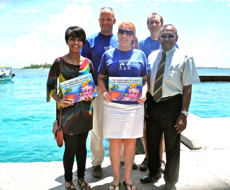A team of 15 volunteers from around the world have begun an expedition in the Maldives to collect data that will be used to compare and protect the health of the country’s vulnerable reef ecosystems.
The amateur marine biologists from countries as diverse as Germany, Russia, Australia and the Maldives have departed on a week-long tour aboard the luxury live-aboard Carpe Diem, during which they will be trained up on the Reef Check program and conduct as many as three research dives a day under the supervision of a team of professional biologists.
The hands-on ‘voluntourism’ trip is organised by not-for-profit wildlife conservation organisation Biosphere Expeditions and Six Senses resorts, which has provided a grant of US$79,000 over the four year program, and scholarships for two young Maldivians – Nishan Thoufeeg and Ahmed Shan – to participate on the trip.
At a press conference launching the expedition this morning, Executive Director of Biosphere Expeditions Dr Matthias Hammer explained that the objective was to involve ordinary people in conservation efforts while generating scientifically-rigorous data that can be used to recommend and implement policy.
Previous expeditions have focused snow leopards in Central Asia, turtles in Australia and jaguars in Brazil, “usually charismatic megafauna,” Hammer said.
Dr Jean-Luc Solantt, a scientist from the Marine Conservation Society in the UK who is accompanying the volunteers, noted that there was a lack of “basic, coarse-level data” required for monitoring reef ecosystems.
“We need to know what is happening on a national scale. The [Reef Check] program has a very basic methodology but it is very scientifically robust.”
The data would contribute to the monitoring and understanding of commercial fish populations, determine the reefs most resilient to environmental pressures, and serve as an early warning system for problems related to warming, bleaching and algae.
“In 1998 the water temperature reached 32 degrees for 4-6 weeks, and that caused most of the reefs down to 30 metres in the Maldives to die,’ he explained. “This data will help us see the pattern of recovery from that global impact, and recommend places that should be made marine protected areas.”
Solantt will check and evaluate the data collected by the group and produce a report based on the expedition. The data will then be collated and made available to scientists worldwide, as well as the Maldives Marine Research Centre (MRC) and the Maldives Whale Shark Research Project, if any of the creatures are spotted.
The group also presented 2500 copies of a colouring book, ‘The Adventures of Anees the Anemonefish’, to State Minister of Education Ibrahim Rasheed.
The book, written by Soneva Fushi’s Marine Biologist Kate Wilson and illustrated by Maldivian artist ‘Angel’, is intended to raise awareness around reef protection and inspire children to seek a career in environmental protection.
“Our country is the most beautiful in the world and we want to keep it that way,” said Deputy Minister Rasheed, “but we can only make policies based on the information and data we receive.”
“We need to make sure people are aware of the fragility of our environment. Education can create this awareness, which is why environment studies is a compulsory subject in the new curriculum,” he said.

Program participants arrived last night from Europe, North America, Russia, Australia, Asia and the Maldives. Some had participated in previous Biosphere projects.
Tina Kuersten from Germany said the biggest results of a Biosphere expedition are seen long-term. “After my first expedition in Altai, I would get emails and updates about the project. It was great to see the results of our work, and to see how I had contributed to something significant.”
Kuersten’s husband Uwe said, “The value of these trips is that you can do something valuable, and learn more about biology.” He said seeing results motivated him to stay involved.
Riswil Ismail, who is from Malaysia, had followed Biosphere’s work for several years. She said in spite of the prohibitive cost, the diving aspect was very attractive.
“I’ve done a lot of dives, and I think because Malaysia and the Maldives are similar it would be great to learn about conservation in this way.”
Ismail said that the concept of paying to go on a volunteer work vacation was “not so popular” in Malaysia.
“People can donate money to a cause, but they don’t always get to see what their money can do. Paying to work on a vacation is a harder concept to understand in Asia, but I think it’s a really valuable way to contribute to a cause. If Maldives is doing this, why not Malaysia?”
Curnow said the average participant is “a well-educated person with a good job who wants to learn something new.” She said that scholarship programs are designed to attract students from the target location. This year, Six Senses’ Soneva Fushi and Soneva Gili resorts are co-sponsoring two Maldivians to take part in the expedition.
Biosphere Expeditions will run trips this week and next week; results are usually published six to eight months afterwards.